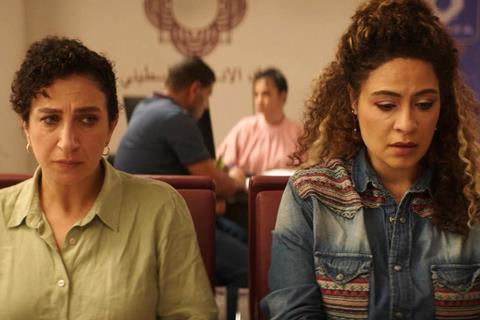Two sisters strain against Palestine’s patriarchal bonds in this effective Ramallah-set debut

Dir/scr: Laila Abbas. Palestine/Germany/Saudi Arabia/Qatar/Egypt. 2024. 97mins
There’s little love lost between Palestinian sisters Mariam (Clara Khoury), a frazzled mum of two, and Noura (Yasmine Al Massri), single and, as a beauty technician, regarded as the family disappointment. But one thing they agree on is that when their elderly father dies, leaving a considerable amount of cash in a savings account, the money should go to the daughters who cared for him – rather than the absentee brother who moved to America. Society’s patriarchal structures make this tricky to achieve, however. Over an eventful night in Ramallah, life starts to unravel but the women rediscover a sisterly bond. This perceptive first feature from Laila Abbas is a reminder that not all stories from Palestine are tales of conflict, and that sometimes just simply being a woman is its own battle.
There’s a taut, race-against-the-clock tension to the storytelling
The film world premieres in the main competition of the London Film Festival, kicking off a festival run that will subsequently take in Sao Paulo, Thessaloniki and AFI. Current interest in stories from the region should ensure that this intimate and at times dryly funny picture, which was filmed in Ramallah and Al-Bīrah in the West Bank, should capture the attention of programmers at further festivals going forward.
It’s certainly a persuasive calling card for Abbas, whose previous work includes Ice & Dust (2014), a mid-length documentary drama about a young Palestinian woman’s journey to a new life in Canada. While Thank You… is by no means the first film to explore the plight of women stifled by Islamic inheritance laws, Abbas’ taut picture is notable for its vividly evoked sense of place – the nighttime streets of Ramallah are empty and still, but there’s a perpetual sense of threat lurking just around the next corner – and for the two satisfyingly fleshed out central performances.
Mariam hauls bags of shopping into the house to find her younger son’s toys spread over every surface and her older son, Ali (Adam Khattar), glued to his phone and watching pornography. Esconsed in an acrimonious marriage, there’s a weariness in Mariam’s expression that suggests that she is accustomed to being the only thing standing between her family and complete chaos. Meanwhile, overworked in the salon, Noura breaks off from performing a facial laser treatment to answer a distressed call from her father. It sounds serious enough for Noura to swallow a lifetime of petty grievances and call her sister. But by the time they get there, it’s too late.
Noura, who lived with her dad as his carer, had anticipated that his days were numbered and had already persuaded him to get a chequebook and bank card. And she has been forging his signature since her delinquent school days. However, cashing a cheque for $165,000 is fraught with complications – not least the fact that the bank needs telephone confirmation from the male account holder before they can agree to release the funds.
This is not the only problem: Mariam’s son Ali has gone missing following the latest violent row with his father. And Mariam is coming to realise that her marriage to her sour-spirited and openly unfaithful husband (Ashraf Barhoum) has run its course. While she has reservations about Noura’s plan to withdraw their Dad’s savings fraudulently, she recognises that the money could buy her a new start and perhaps even that most elusive thing: happiness. “What’s with your obsession with happiness?” growls her brother over the phone from America. “My wife’s not happy,” he adds by way of justification.
There’s a taut, race-against-the-clock tension to the storytelling, as the sisters rattle around the city in Noura’s battered car, dodging gangs of youths gathered to protest the presence of Israeli forces in the streets (this, a television news story and a passing comment from Mariam is the main reference to tensions between Palestine and Israel). And as each man they approach for help with their plight rebuffs or insults them, there’s a dawning realisation: sisters really do need to do it for themselves.
Production companies: August Films, In Good Company Films
International sales: MAD Solutions, info@mad-solutions.com
Producers: Hanna Atallah, Ronza Kamel, Roshanak Behesht Nedjad
Cinematography: Konstantin Kröning
Editing: Heba Othman
Production design: Rami Arda
Main cast: Clara Khoury, Yasmine Al Massri, Kamel El Basha, Ashraf Barhoum, Adam Khattar
























